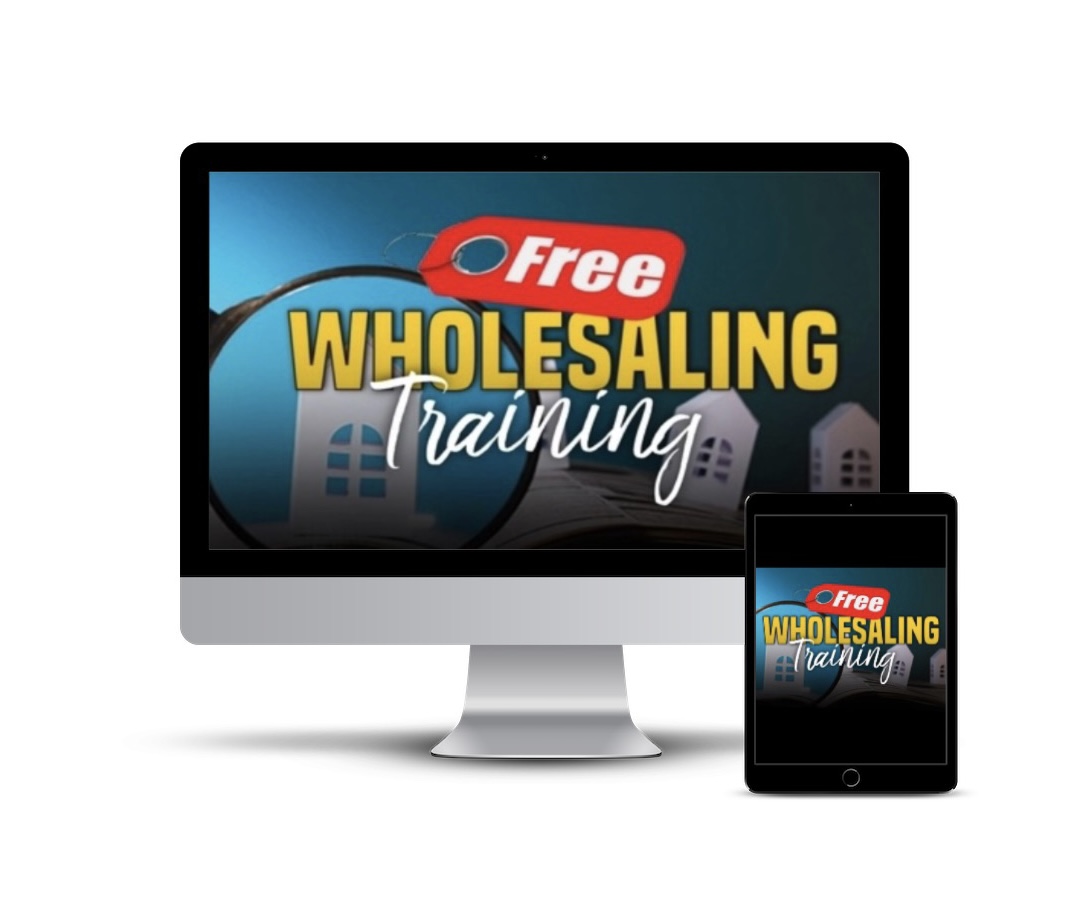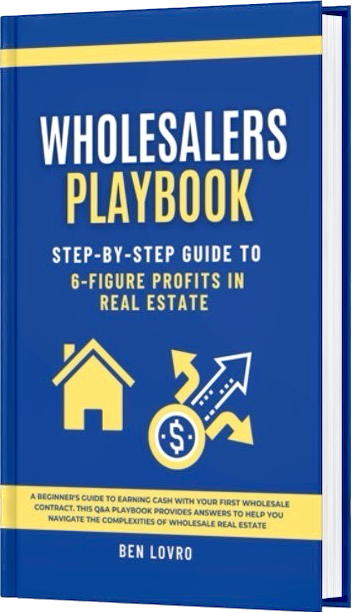FREE WHOLESALING COURSE
Get The Exact Blueprint To Launch And Grow A Successful Real Estate Wholesaling Business


How Does Wholesaling Work In The Real Estate Industry?
Introduction
Various strategies appeal to different types of investors. Wholesaling, with its unique approach and low-entry barrier, has captured the attention of many. But what exactly is wholesaling in the real estate industry?

Wholesaling Defined
Wholesaling in the real estate domain is a strategy that involves finding a property that is under contract and then quickly assigning or reselling that contract to an end buyer. The wholesaler acts as a middleman, facilitating the transaction between the original seller and the final buyer.
The process begins with the wholesaler identifying a property that has the potential for a profitable deal. This could be a distressed property, a foreclosure, or a property being sold at a below-market price. The wholesaler then negotiates with the seller to secure the property under contract, typically at a discounted price.
Once the property is under contract, the wholesaler's main objective is to find an end buyer who is willing to purchase the property at a higher price than the contracted amount. This allows the wholesaler to make a profit without ever taking possession or title of the property.
To find an end buyer, the wholesaler may employ various marketing strategies such as advertising the property through online platforms, networking with other real estate professionals, or reaching out to potential investors. The goal is to generate interest and attract buyers who are looking for investment opportunities.
When an end buyer is found, the wholesaler assigns the contract to them. This means that the original contract between the wholesaler and the seller is transferred to the end buyer, who then becomes responsible for fulfilling the terms of the contract. In exchange for assigning the contract, the wholesaler receives an assignment fee, which is the difference between the contracted price and the price at which the property is sold to the end buyer.
Wholesaling can be a lucrative strategy for real estate investors as it allows them to generate quick profits without the need for significant financial resources or long-term commitments. However, it requires a deep understanding of the local real estate market, strong negotiation skills, and the ability to effectively market and find potential buyers. Additionally, it is important for wholesalers to comply with all legal requirements and regulations governing real estate transactions in their jurisdiction.. Essentially, a wholesaler serves as the intermediary between the seller and the end buyer.
The Wholesaling Process Broken Down
Wholesaling is a real estate investment strategy that involves finding properties at a discounted price and then selling them to other investors for a profit. While it may seem straightforward, there are several steps and stages involved in the wholesaling process.
1. Research and Analysis: The first step in wholesaling is to research and analyze the real estate market. This includes identifying potential areas where there is a high demand for properties and a low supply. Additionally, wholesalers need to analyze the current market conditions, such as property values, rental rates, and market trends.
2. Finding Distressed Properties: Once the market has been analyzed, wholesalers need to find distressed properties that can be purchased at a discounted price. This can be done through various methods, such as networking with real estate agents, attending foreclosure auctions, or using online platforms that list distressed properties.
3. Negotiating the Purchase: After identifying a potential property, wholesalers need to negotiate the purchase price with the seller. This involves conducting a thorough inspection of the property to identify any repairs or issues that may affect its value. Wholesalers then use this information to negotiate a lower purchase price.
4. Securing the Property: Once the purchase price has been agreed upon, wholesalers need to secure the property by signing a purchase agreement or contract. This legally binds both parties to the transaction and ensures that the property is taken off the market.
5. Building a Buyers List: While the property is being secured, wholesalers need to start building a buyers list. This involves networking with other real estate investors, attending local real estate meetings, and using online platforms to connect with potential buyers. The buyers list is crucial as it allows wholesalers to quickly sell the property once it is under contract.
6. Marketing the Property: With the property secured and the buyers list in place, wholesalers need to market the property to potential buyers. This can be done through various methods, such as creating online listings, hosting open houses, or using social media platforms to reach a wider audience.
7. Assigning the Contract: Once a buyer is interested in purchasing the property, wholesalers can assign the contract to them. This means that the wholesaler transfers their rights and obligations under the purchase agreement to the buyer. In return, the buyer pays the wholesaler an assignment fee, which is the profit made from the transaction.
8. Closing the Deal: This involves coordinating with the buyer, seller, and any necessary professionals, such as attorneys or title companies, to ensure a smooth transaction. Once all
Market Research: Every successful wholesaler knows that understanding the local real estate market is crucial. It helps identify neighborhoods with potential deals, understand property values, and gauge the demand for homes.
Identify Potential Deals: Wholesalers look for properties that are usually sold below market value. These might be distressed properties, foreclosures, or properties owned by individuals in urgent need of cash. Effective marketing strategies, like direct mail, digital advertising, or even traditional methods like bandit signs, can help in attracting potential sellers.
Secure the Property Under Contract: Once a potential deal is identified, the wholesaler enters into a contractual agreement with the seller. This contract gives the wholesaler the exclusive right to buy the property at a determined price. However, the wholesaler's intent isn't to buy but to sell this contract to an end buyer.
Determine the Property's Value: Before advertising the property to potential buyers, the wholesaler must determine its after-repair value (ARV). This is an estimate of what the property will be worth after any necessary repairs and renovations. This helps set a competitive and attractive price for the end buyer.
Find an End Buyer: With the property under contract, the wholesaler's next task is to find an end buyer willing to take over the contract. This buyer is typically a real estate investor looking for properties to rehab, rent, or resell. The wholesaler's profit comes from the difference between the contracted price with the seller and the amount the end buyer agrees to pay.
Assigning or Closing the Deal: There are two primary ways to finalize a wholesale deal:
Assignment: The wholesaler assigns the original contract to the end buyer for a fee. This is the most common method of wholesaling. It involves transferring the rights of the original contract to a third party. The end buyer pays the wholesaler the assignment fee, and then they proceed to close the deal with the original seller.
Double Closing: Sometimes referred to as a "simultaneous close," this method involves the wholesaler temporarily buying the property from the seller and then immediately selling it to the end buyer. Two separate sets of closing documents are used, but the wholesaler is not registered in public records as the owner.
Benefits of Real Estate Wholesaling
Low Capital Requirement: Unlike other real estate strategies, wholesaling requires minimal upfront capital since the wholesaler doesn't actually purchase the property.
Reduced Risk: Wholesalers typically aren't responsible for repairs, maintenance, or property management, which lessens the risks associated with property ownership.
Quick Returns: Since wholesaling deals can often close within weeks, it provides an opportunity for quick financial returns.
Learning Experience: For those new to real estate, wholesaling offers a practical education in market research, negotiations, and understanding property values.
Challenges in Wholesaling
Dependent on Market Conditions: A saturated market with many wholesalers can make finding discounted properties challenging.
Regulatory Considerations: Some states have specific regulations regarding wholesaling. Wholesalers need to be aware of local laws to avoid potential legal pitfalls.
Reliance on Networking: A wholesaler's success is closely tied to their network of investors. Building and maintaining this network is crucial but can be challenging.
Ethical Implications: Wholesalers must operate ethically, ensuring they provide value to both sellers and buyers. There's a fine line between securing a below-market deal and exploiting uninformed or distressed sellers.
Wholesaling in the Modern Digital Age
The rise of technology has transformed many sectors, including real estate wholesaling. Modern wholesalers utilize digital platforms to find deals, assess property values, and connect with potential buyers. Websites, social media channels, and real estate apps have become invaluable tools in a wholesaler's arsenal.
In Conclusion: The Art of Wholesaling
Wholesaling, at its core, is about finding opportunities and connecting buyers with sellers. It requires diligence, market insight, and a robust network. While it offers an avenue for quick returns with relatively low investment, it's not without challenges. For those willing to navigate its intricacies, wholesaling can be a lucrative venture in the expansive world of real estate investment. Whether you're a seasoned investor or a newbie exploring the real estate terrain, understanding the mechanics of wholesaling is fundamental to recognizing its potential rewards and inherent risks.

Search Blog
Year
Month



